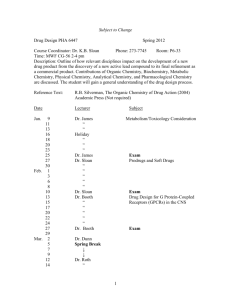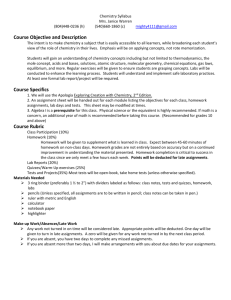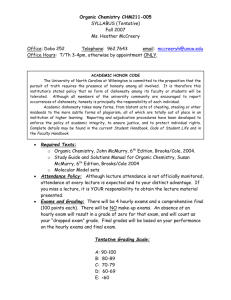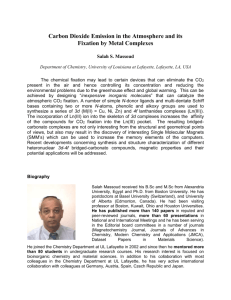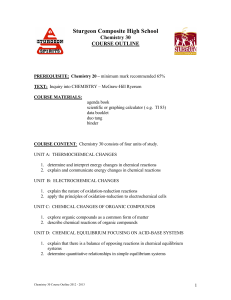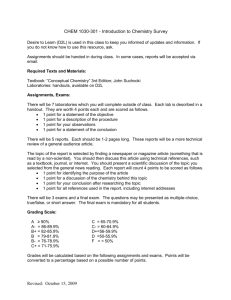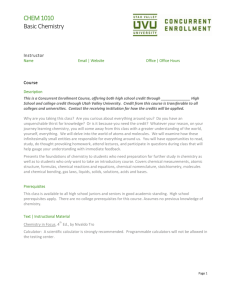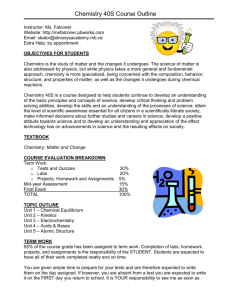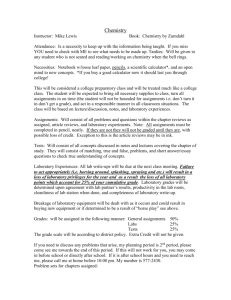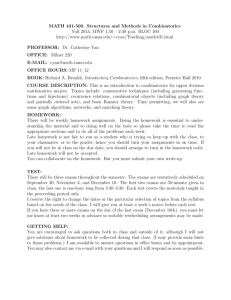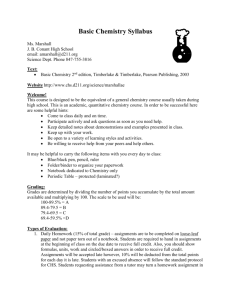Class Outline/Schedule, Spring 2008
advertisement
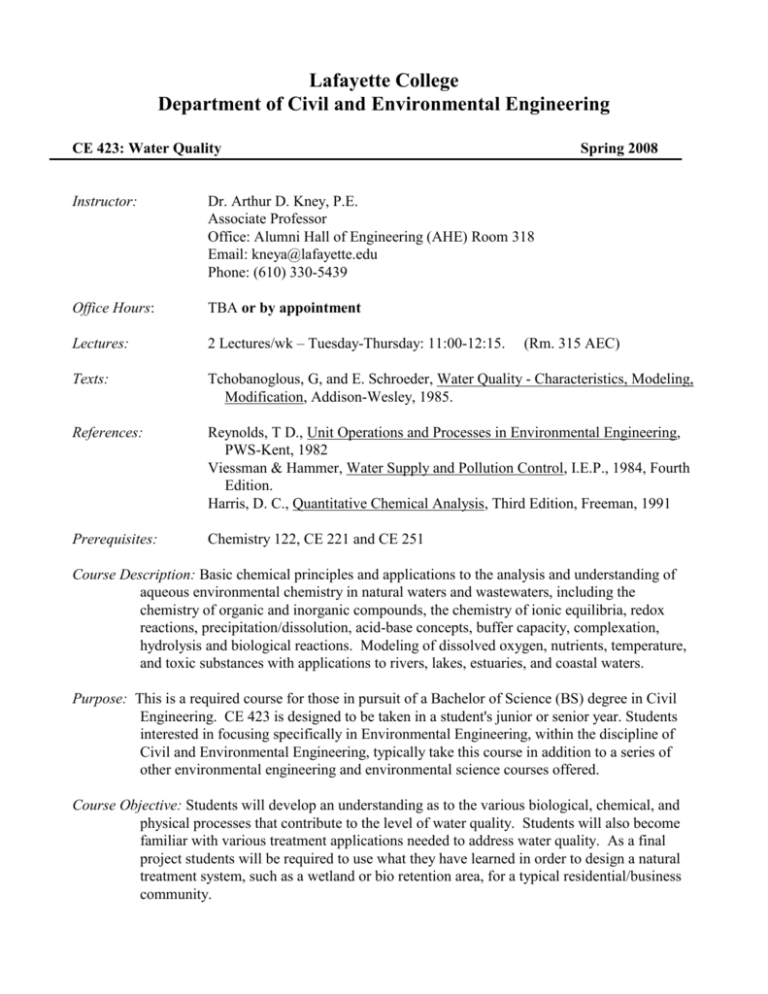
Lafayette College Department of Civil and Environmental Engineering CE 423: Water Quality Spring 2008 Instructor: Dr. Arthur D. Kney, P.E. Associate Professor Office: Alumni Hall of Engineering (AHE) Room 318 Email: kneya@lafayette.edu Phone: (610) 330-5439 Office Hours: TBA or by appointment Lectures: 2 Lectures/wk – Tuesday-Thursday: 11:00-12:15. Texts: Tchobanoglous, G, and E. Schroeder, Water Quality - Characteristics, Modeling, Modification, Addison-Wesley, 1985. References: Reynolds, T D., Unit Operations and Processes in Environmental Engineering, PWS-Kent, 1982 Viessman & Hammer, Water Supply and Pollution Control, I.E.P., 1984, Fourth Edition. Harris, D. C., Quantitative Chemical Analysis, Third Edition, Freeman, 1991 Prerequisites: Chemistry 122, CE 221 and CE 251 (Rm. 315 AEC) Course Description: Basic chemical principles and applications to the analysis and understanding of aqueous environmental chemistry in natural waters and wastewaters, including the chemistry of organic and inorganic compounds, the chemistry of ionic equilibria, redox reactions, precipitation/dissolution, acid-base concepts, buffer capacity, complexation, hydrolysis and biological reactions. Modeling of dissolved oxygen, nutrients, temperature, and toxic substances with applications to rivers, lakes, estuaries, and coastal waters. Purpose: This is a required course for those in pursuit of a Bachelor of Science (BS) degree in Civil Engineering. CE 423 is designed to be taken in a student's junior or senior year. Students interested in focusing specifically in Environmental Engineering, within the discipline of Civil and Environmental Engineering, typically take this course in addition to a series of other environmental engineering and environmental science courses offered. Course Objective: Students will develop an understanding as to the various biological, chemical, and physical processes that contribute to the level of water quality. Students will also become familiar with various treatment applications needed to address water quality. As a final project students will be required to use what they have learned in order to design a natural treatment system, such as a wetland or bio retention area, for a typical residential/business community. CE 423 Syllabus, Spring 2002 Learning Outcomes: Once students have completed the course they will: 1) have a strong understanding of the laws that regulate water quality throughout the US, 2) have developed an understanding as to the various biological, chemical, and physical processes that contribute to the level of water quality, 3) have a strong understanding of various analytical methods needed to assess water quality, 4) a general understanding of how to analyze data generated from various analytical methods and make use of it, 5) have developed an understanding of various treatment methods, and 6) work as an individual or as a team member in order to accomplish a required goal. Grading: Two exams, midterm and final: Homework: Paper/Presentation 30 % each 20 % 15 % Attendance, participation, and effort will play at a least a 5% role in a student’s final grade. More than two unexcused absences from class are highly discouraged. Exam: Each exam will cover only the material since the previous exam. However, some topics from earlier parts of the course provide the basis for later material, and in that sense, the exams are comprehensive. All exams are closed book and closed notes - the best way to prepare is to study your class notes and homework problems. An equation sheet will be provided if necessary. Homework: Assignments will vary between weekly to every other week. Homework will be due one week from the date assigned, unless otherwise directed. Homework guidelines put forth by the Lafayette Engineering Division will be followed. Students are encouraged to work together on the problems, which are to be done in a neat, professional manner, on engineering paper or computer output, with solutions clearly explained and presented. Note: working together does not mean copying - you must do your own written work! Make sure that correct units are included with all numerical answers and are consistent. It is also a good idea to check the "reasonableness" of your work after you are done your calculations. Late homework or lab assignments will be accepted only if you have made prior arrangements with me. Solutions will be posted in a binder found in a common location. Note on Academic Dishonesty: The College has clear written policies on academic dishonesty (see Student Handbook, pages 7 and 68). It is particularly important to provide references for any material you use in your assignments or term paper, whether paraphrased or quoted directly. 2
